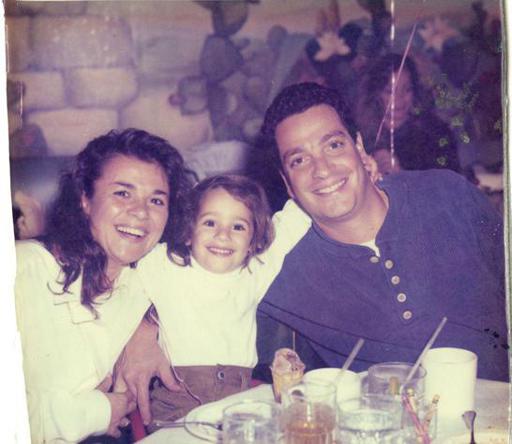Brunette Ambition (4 page)
Authors: Lea Michele
Tags: #Self-Help, #Personal Growth, #General, #Biography & Autobiography, #Entertainment & Performing Arts, #Fashion & Style

All smiles with my parents at the dinner table.
When sensory overload strikes and I can’t step away, I’ll run through a quick meditation exercise. I close my eyes, tune out my surroundings, and just focus on taking deep breaths in through my nose and out through my mouth. Freaking out during a pop quiz or an overwhelming day at the office? I urge you to take a walk to the bathroom and try it.
And finally, I look for any opportunity to decompress. I grew up in a family where love is best expressed through food, so being in the kitchen is one of my favorite ways to unwind. My ultimate comfort food? Hearty soup or grilled cheese sandwiches—eaten while watching reality TV. Whether you find your calm through a delicious snack, a long run, or a phone call with a friend, don’t let the stress of the outside world impose on your sense of perspective. Regardless of what it takes, make sure that you touch base, as often as possible, with all the things that make you you.
The Spotlight
1.
Be you. It’s so cheesy, but there’s no one better at being you than you. Don’t slough off the things that make you special just to fit a mold—your story is the most interesting thing you’ve got going for you, so use it!
2.
Be proud of all the things that make you different, and flex those distinctions—where you come from and your family—as your biggest strengths.
3.
Remember your role models and keep them in your mind as signposts for everything that’s possible in life. Whether you’re fifteen or fifty, it’s always good to surround yourself with people you find inspiring and from whom you believe you can learn.
4.
Keep the people who love you, like your family, close. They made you who you are, so don’t neglect them on your road to achieving your goals. Assuming they’re supportive, use them as a resource for strength and guidance. That’s what they’re there for!
5.
Don’t let stress derail you: Don’t forget to check in with yourself every night.
CH 2
THE BIZ
“You have got to discover you, what you do, and trust it.”
—BARBRA STREISAND

I
’ve been collecting a paycheck since I was a little girl—doing jobs that seem too fun to be considered work. When I was eight, I landed on Broadway and started down the path to make my first childhood dream come true. No, I didn’t want to be a princess, or a doctor, or even a member of the Mickey Mouse Club. I wanted to be a diva! It’s funny that the word has negative connotations in Hollywood, because growing up, that was my dream! That’s what every girl on Broadway strives to be. After all, didn’t Beyoncé say that a diva is just a female version of a hustler? In New York, being a diva doesn’t have negative connotations—it has great connotations. I wanted to live my life in stage makeup, in Times Square. I wanted to tackle all the famous Broadway roles, not only those played by its most famous leading ladies, either, but those played by the leading men, too. Because, quite frankly, why not? Any girl would want to play Maria from
West Side Story
, but what preteen fantasizes about playing Don Quixote in
Man of La Mancha
?
Once I found my place on Broadway, the passion and determination and motivation to make the stage my home forever took hold. I knew there was no other place for me to be, that I was lucky enough to find, at a very young age, exactly what I was good at and exactly what made me happy. And I intended to follow my heart and to keep performing—all with a smile on my face. Don’t get me wrong: It wasn’t always as easy as my first open audition when I was eight. After all, I wandered into that audition with no conception of how it would change my life—I only went because my best friend, Chloe, wanted to go, and somehow I ended up landing the role of Cosette on Broadway. I’ve definitely suffered my fair share of sucker-punch rejections and miscues: I’ve lost out on roles that I believed, at the time, were everything I needed to take the next step; I’ve lost count of the times that people who theoretically know all about these things told me I was making the wrong decisions (like the time that someone told me
Spring Awakening
would flop and I shouldn’t do it, when it was actually one of the biggest catapults in my career—more on that later). But those bumps and burns only made me more thankful that I knew so deeply that I had found my true home, because I never for a second stopped pushing forward, thought about quitting, or ignored my own gut. I had the resolve to carry on, because nothing ever felt as right as performing, and I somehow knew that if I maintained my energy and enthusiasm and drive and sanity, and continued to work hard, I’d find my way through.
I’ve learned a lot of life skills on the stage along the way, which I will touch on in a few pages, but one of the most powerful lessons I learned is that you don’t always get the jobs, and breaks, that you think you want and think you deserve. Just as you’ll likely be passed over for a promotion at some point in your career, I’ve been passed over for a lot of roles. And while it always seemed like the end of the world, or at least the end of my career, in that moment, everything has always worked out for the best. Case in point: I was devastated when I didn’t land a part in the Broadway revival of
West Side Story
, as that’s one of the shows I’ve always wanted to do, and I truly believed that would be my next big thing. It wasn’t meant to be, and as tough as that was to fathom in the days after the rejection, a month later I got the part of Rachel Berry. As difficult as it can be to put your faith in the future, if you do your part by working hard and trying your best, I truly believe that good things will always come and the right path will make itself evident.
Whether you’re considering a career on the stage or a career at a desk, I hope that it’s a path you’re so passionate about that you’ll fight for every opportunity. I hope it sings to every fiber of your being and that you can’t imagine doing anything else. Perhaps my job consumes a larger percentage of my life than that of the average person, but even forty hours a week is too many hours to spend doing something that makes you unhappy. And I would be a fool to suggest that happiness can be a constant state, particularly when it comes to work, but it should feel joyful at times, and fulfilling, and productive, and challenging as much as possible. You should feel like you’re climbing a ladder that’s worth climbing.
Here’s a look at my career trajectory so far—and all the important lessons I’ve learned along the way. While these may seem to apply most directly to Broadway, I can’t imagine that they wouldn’t have prepped me for a normal day job, too.
LES MISÉRABLES (1995)
LESSONS LEARNED: BASIC PROFESSIONALISM AND OPTIMISM
BASIC PROFESSIONALISM
Les Misérables
was the perfect introduction to what it means to have a job. I was one of three eight-year-old girls who played the parts of Young Cosette and Young Eponine: During the eight shows a week, we would rotate through those two roles and every third time become the understudy to the other two, in case someone got sick or otherwise couldn’t perform.
Needless to say, I took to Broadway life like a fish to water, both the performing part and the job part. Sure, I had had a schedule before: a time to be at school, a time to go to bed. But I’d never been in a position where my actions affected other people directly. Quite simply, I had to behave. Because the show had been running on Broadway for a long time, they had a strong system in place for teaching us all the ropes of show business. I may have been precocious, but I really took that time to learn the seemingly simple rules of getting along in an adult world.
I immediately had to be professional, which on Broadway—and arguably beyond—means that I had to be on time; take care of myself and not get too tired or sick; and get along with, and work well with, others. It was very clear that we were each just one piece of a complex puzzle and that for the puzzle to come together correctly, we all had to do our part. I took all of this very seriously and absolutely loved being good at my job just as much as I loved playing with the other kids backstage. It was while doing
Les Misérable
s that I learned that being the best at what you do and enjoying yourself while doing it are not mutually exclusive. That might seem like a silly lesson, but it’s informed my entire career. Work can be fun!
IT WAS WHILE DOING
LES MISÉRABLES
THAT I LEARNED THAT BEING THE BEST AT WHAT YOU DO AND ENJOYING YOURSELF WHILE DOING IT ARE NOT MUTUALLY EXCLUSIVE. THAT MIGHT SEEM LIKE A SILLY LESSON, BUT IT’S INFORMED MY ENTIRE CAREER. WORK CAN BE FUN!
And sure, we were eight years old; we definitely did our share of goofing around. Our story line took place at the beginning of the show, but we had to stick around for curtain call, so we took that time to literally play Broadway. While our peers might have been playing house, we were reenacting
Miss Saigon
and
The Phantom of the Opera
. Clearly, we all loved the stage.
OPTIMISM
Like all the other kids in the cast, I wanted to be in
Les Misérables
forever. But all good things must end, and for kids on Broadway, things end when you literally outgrow the part. We had to be measured every week: Some stage moms would teach their kids how to slouch, so they could stick around for a bit longer, but my parents always told me to stand up straight. They felt like I needed to learn that just because
Les Misérables
was amazing and fun didn’t mean that there wouldn’t be more amazing and fun things down the road. They always urged me to enjoy it while it lasted, with the understanding that there would be something great for me when it was over. It’s hard to have that sort of faith when one show is all you’ve known and you’ve made great friends along the way, I would be lying if I didn’t admit to crying my face off when I got the call that I had outgrown my role. But sure enough, two weeks later, I landed another part, where I learned some more important lessons.

Little me—at around eight years old—doing a press appearance for
Les Mis
.
